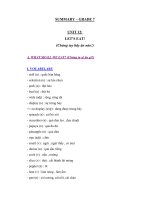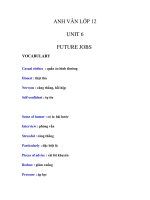Unit 12 future tense
Bạn đang xem bản rút gọn của tài liệu. Xem và tải ngay bản đầy đủ của tài liệu tại đây (170.81 KB, 16 trang )
FUTURE SIMPLE
TƯƠNG LAI THƯỜNG
Prepared by Nguyen Trung Kien
Will structure
The future simple tense is composed of two parts: will/shall +
base verb. Will and shall are often contracted to 'll.
Affirmative form (Positive)
I
we
+ shall / will + work
you
he/she/it
they
+ will + work
1. I shall/will write her tomorrow.
2. We shall/will go shopping together during the holidays.
Will structure
Note: 'Will' is used with all persons. 'Shall' can be used instead of 'will'
with I/we. In modern English, particularly in American English,
'shall' with a future reference is rarely used.
Negative form
I
we
I
you
he/she/it
we
they
SHALL + NOT
/SHAN'T/ +
WILL + NOT
/WON'T/
+ WORK
I won't answer that question.
They won't accept this offer.
WORK
Will structure
Interrogative form (Question)
To form interrogative sentences we use will with all persons:
WILL
I
we
WORK?
WILL
you
he/she/it
they
WORK?
Will you open the window, please?
Will you do it for me?
Will structure
Note: We use shall to make offers, ask for advice or suggestions,
etc. (mainly in British English)
1. Shall I close the door?
2. Shall we go to picnic tomorrow?
3. Shall I study English?
'Shall' is also used as an imperative in formal or legal written
statements:
1. The Chairman shall be present at the Company's general
meetings.
2. The accused shall be present during the trial.
Will the use
We use will when there is no prior plan or decision to do something
before we speak. We make the decision at the time of speaking
(spontaneous decision) to volunteer to do something (the action is
decided at the moment of speaking)
Look at these examples:
Hold on. I'll get a pen.
We will see what we can do to help you.
Maybe we'll stay in and watch television tonight.
I'll close the window.
I'll have a cup of tea, please.
The phone is ringing.
- I'll answer it.
- Oops, I dropped my pencil.
- I'll pick it up.
In these examples, we had no firm plan before speaking. The decision
was made at the time of speaking.
Will the use
To predict future events (for example, to say what we think or
believe will happen), we use both 'will' and 'going to' . We
often use will with the verb think:
I think I'll go to the gym tomorrow.
I think I'll have a holiday next year.
I don't think I'll buy that car.
! But note that we use 'going to' (not 'will') to make predictions
about events when there is a concrete evidence:
Look at those dark clouds in the sky. It is going to rain soon.
Will the use
To make promises or threats
Examples:
1.
I'll be there at 7 p.m., I promise.
2.
I'll tell your parents what you did.
To request help or to offer help
Examples:
1. Will you please help me to do my homework?
2. That suitcase is too heavy. I’ll help you.
Will the use
With words and expressions such as:
probably, possibly, perhaps, (I'm) sure,
(I) expect
Examples:
1.
2.
3.
I'll probably get there by my car.
You must read this book. I'm sure you'll like it.
I expect Tom will pass his exam.
Will the use
To talk about consequences (with if, when, provided,
unless, as, as soon as, as long as, etc.)
Examples:
1.
If it begins to rain, I'll certainly nead an umbrella.
2.
She will tell him when he calls.
When the main verb is be even if we talk about
planned events
Examples:
1.
I'll be in Athens tomorrow.
2.
I'll be at a conference next week.
Will exercises
Make positive, negative and questions with the followings:
1. they / call / us
Positive: ……………………………………..
Negative: ……………………………………
Question: ……………………………………
2. John / dial / the number for you
Positive: ……………………………………..
Negative: ……………………………………
Question: ……………………………………
3. he / marry / his girlfriend
Positive: ……………………………………..
Negative: ……………………………………
Question: ……………………………………
Will exercises
Will or be going to?
Rule of thumb 1
'Going to' is a kind of present tense – look at its form! – so you
use it when you want to talk about a future situation that is
already connected to the present, e.g. because there’s present
evidence, or because a plan is already in motion:
Examples:
I think it’s going to rain – I just felt a drop.
They’re going to retire to the country – they’ve already bought a
little cottage.
In other cases, where there is no implicit or explicit connection
to the present, use will:
The concert will be over by midnight.
I’ll light the barbecue.
Will or be going to?
And/or: Rule of thumb 2:
When you’re making predictions, you can use will or going to
more or less interchangeably.
Examples:
I think it’s going to rain.
I think it will rain.
When you’re expressing an intention or decision, use will if you’re
making the decision as you speak; use going to if you have
already made the decision:
Examples:
Can you give me a hand?OK. I’ll light the barbecue.Can you
give me a hand?No, sorry. I’m going to bath the baby.
Will or be going to?
And/or Rule of Thumb 3:
To talk about the future use will. This is the rule that most learners
operate on. Statistically, it is a safe bet. Will is much more common
than going to in all meanings (prediction and intention) and all
registers (conversation and writing). In fact, will is the most common
modal verb in English. Future meaning is more often expressed by will
than any other form. So, when in doubt, use will. (These facts come
from the Longman Grammar of Spoken and Written English which is
based on a 40-million word corpus of spoken and written text).
And/or Rule of Thumb 4:
Use will in writing and going to in speaking. While this is not as reliable
as Rule of Thumb 3, it is supported by corpus evidence. Going to is
most common in conversation (although never as common as will),
and more common in American than British conversation. It is
relatively infrequent in written English.
Will
fin









